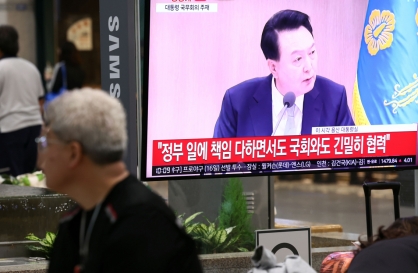A recently proposed bill that will grant special college admission to students at Danwon High School ― which saw over 200 of its students perish in the deadly ferry accident in April ― is sparking criticism in education circles.
The bill, currently pending at the National Assembly, will allow the third-year students at the school, siblings or lineal descendants of those who lost their lives in the ferry accident to enter colleges via a special admissions program. Over 300 were left dead or missing when the Sewol ferry sank off Korea’s southwestern coast on April 16.
“Some say this is overcompensation (for Sewol victims), but most of the colleges have already confirmed their admissions for the following school year. This means only a handful of colleges will be available for these students,” said Rep. Yoo Eun-hae of the New Politics Alliance for Democracy, who proposed the controversial bill.
In Korea, students from socially disadvantaged groups are allowed to benefit from the program. Colleges can admit students outside of their usual quota via this special program.
Yoo and supporters of the bill say that students with connections to the ferry victims have been unable to prepare for the crucial College Scholastic Ability Test in November because of all the commotion caused by the accident.
Some schools, including Kyung Hee University, already said they will offer special admission while others like Ewha Womans University and Hanyang University are mulling whether to follow suit.
The new policy is not without precedent. After the North’s 2010 attacks on Yeonpyeongdo Island, students from nearby areas were allowed to participate in a special admission program.
But critics have raised questions over whether the special treatment for the students in question is fair. Korea is widely regarded as one of the most competitive nations when it comes to education, and a huge amount of money is spent on getting into prestigious colleges. Against this backdrop, granting leg-ups in college entrance is an extremely touchy subject, even if the beneficiaries were involved in the Sewol tragedy.
“The special admissions itself has a limited quota, which means less students from other disadvantaged groups would be able to enjoy this privilege,” said Im Seong-ho, an educational consultant and the head of Haneul Education. “And what happens when incidents like the Sewol sinking happen in the future? The victims will say, ‘How come we don’t get special consideration in college admissions?’ thus sparking even more controversy.”
Lee Jong-soo, a professor of public administration at Yonsei University said while students related to the Sewol tragedy should receive some form of benefits in college entrance, passing a law on this is clearly an overreaction.
“We should definitely treat these students with special consideration, but the colleges should be allowed to decide how to do that,” Lee said. “The government has been attempting to dictate the actions of colleges instead of assuring their freedom, which has sparked even more opposition.”
Ironically, families of deceased Danwon students have maintained that they did not want this benefit from the beginning. They even told lawmakers to halt discussions on the subject, fearing that it would impede the government from passing a special bill on the Sewol tragedy investigation.
Yoo Kyung-keun, who represents the families of the victims and survivors, said their only concern was to discover the truth about what caused the ferry to sink.
By Yoon Min-sik (minsikyoon@heraldcorp.com)
The bill, currently pending at the National Assembly, will allow the third-year students at the school, siblings or lineal descendants of those who lost their lives in the ferry accident to enter colleges via a special admissions program. Over 300 were left dead or missing when the Sewol ferry sank off Korea’s southwestern coast on April 16.
“Some say this is overcompensation (for Sewol victims), but most of the colleges have already confirmed their admissions for the following school year. This means only a handful of colleges will be available for these students,” said Rep. Yoo Eun-hae of the New Politics Alliance for Democracy, who proposed the controversial bill.
In Korea, students from socially disadvantaged groups are allowed to benefit from the program. Colleges can admit students outside of their usual quota via this special program.
Yoo and supporters of the bill say that students with connections to the ferry victims have been unable to prepare for the crucial College Scholastic Ability Test in November because of all the commotion caused by the accident.
Some schools, including Kyung Hee University, already said they will offer special admission while others like Ewha Womans University and Hanyang University are mulling whether to follow suit.
The new policy is not without precedent. After the North’s 2010 attacks on Yeonpyeongdo Island, students from nearby areas were allowed to participate in a special admission program.
But critics have raised questions over whether the special treatment for the students in question is fair. Korea is widely regarded as one of the most competitive nations when it comes to education, and a huge amount of money is spent on getting into prestigious colleges. Against this backdrop, granting leg-ups in college entrance is an extremely touchy subject, even if the beneficiaries were involved in the Sewol tragedy.
“The special admissions itself has a limited quota, which means less students from other disadvantaged groups would be able to enjoy this privilege,” said Im Seong-ho, an educational consultant and the head of Haneul Education. “And what happens when incidents like the Sewol sinking happen in the future? The victims will say, ‘How come we don’t get special consideration in college admissions?’ thus sparking even more controversy.”
Lee Jong-soo, a professor of public administration at Yonsei University said while students related to the Sewol tragedy should receive some form of benefits in college entrance, passing a law on this is clearly an overreaction.
“We should definitely treat these students with special consideration, but the colleges should be allowed to decide how to do that,” Lee said. “The government has been attempting to dictate the actions of colleges instead of assuring their freedom, which has sparked even more opposition.”
Ironically, families of deceased Danwon students have maintained that they did not want this benefit from the beginning. They even told lawmakers to halt discussions on the subject, fearing that it would impede the government from passing a special bill on the Sewol tragedy investigation.
Yoo Kyung-keun, who represents the families of the victims and survivors, said their only concern was to discover the truth about what caused the ferry to sink.
By Yoon Min-sik (minsikyoon@heraldcorp.com)








![[From the Scene] Monks, Buddhists hail return of remains of Buddhas](http://res.heraldm.com/phpwas/restmb_idxmake.php?idx=644&simg=/content/image/2024/04/19/20240419050617_0.jpg&u=20240419175937)







![[From the Scene] Monks, Buddhists hail return of remains of Buddhas](http://res.heraldm.com/phpwas/restmb_idxmake.php?idx=652&simg=/content/image/2024/04/19/20240419050617_0.jpg&u=20240419175937)

![[KH Explains] Hyundai's full hybrid edge to pay off amid slow transition to pure EVs](http://res.heraldm.com/phpwas/restmb_idxmake.php?idx=652&simg=/content/image/2024/04/18/20240418050645_0.jpg&u=20240419100350)

![[Today’s K-pop] Illit drops debut single remix](http://res.heraldm.com/phpwas/restmb_idxmake.php?idx=642&simg=/content/image/2024/04/19/20240419050612_0.jpg&u=)